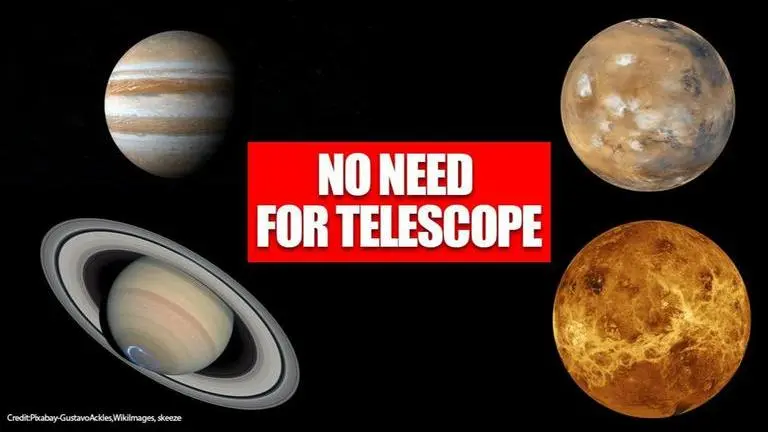Updated 17 July 2020 at 13:49 IST
Moon and five planets will appear all at once on July 19, here's how you can see
Mars will be visible as a curved line going through Jupiter and Saturn. Venus will be easy to spot as it will look super-bright in the night sky.
- Science News
- 2 min read

In one of the rare occurrences that will take place on July 19, people will be able to see five planets in the sky that will appear simultaneously before the sunrise and will be visible along with a crescent moon. The five planets, Mercury, Venus, Mars, Jupiter, and Saturn will appear in the sky about two hours before the sunrise. All the planets will be visible to the naked eye, however, to see Mercury, telescope or binoculars will likely be needed. Jupiter and Saturn will be the first planets that people will be able to spot in the southwestern sky. Jupiter will appear as a sinking bright start and the ringed planet just above it in the right corner.
According to planet observers, Mars will be visible as a curved line going through Jupiter and Saturn. Venus will be easy to spot as it will look super-bright in the night sky where the curve line of Mars goes down to the horizon in the northeast. Mercury will be hard to spot and one might need a telescope or a pair of binoculars to see it. According to reports, Mercury will be visible 45 minutes before the sunrise in the northeast. Although there is no need for telescope or binoculars to watch Jupiter, we might see it is one or two of its four largest moons if we use them.
Advertisement
Solar eclipse on summer solstice day
People last month witnessed another rare occurrence as they saw the solar eclipse on the same day as the summer solstice, the longest day of the year after which the days begin waning again. The eclipse started at 9:15 am and was visible until 3:04 pm with the maximum eclipse taking place at 12:10 pm. It was visible from Asia, Africa, the Pacific, the Indian Ocean, parts of Europe and Australia. The solstices are generally the opposites on the two sides of the equator. For example, the summer solstice in the southern hemisphere is winter on the other side, which is in the northern hemisphere, and reverse every time.
Advertisement
Published By : Vishal Tiwari
Published On: 17 July 2020 at 13:49 IST
